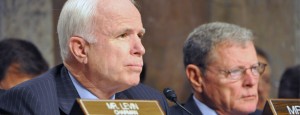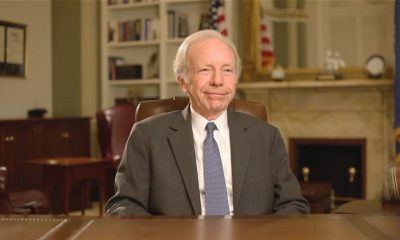National
Despite compromise, advocates celebrate votes to repeal ‘Don’t Ask’
McCain pledges to derail ‘Don’t Ask’ momentum
Gay veterans are celebrating congressional action last week to repeal “Don’t Ask, Don’t Tell,” 17 years after Congress passed a law banning gays from serving openly in the U.S. military.
The House and Senate took separate actions that would lead to an end of the statute. Both chambers approved amendments repealing “Don’t Ask, Don’t Tell” as part of major defense budget legislation known as the fiscal year 2011 defense authorization bill.
On May 27, the House voted 234-194 on the floor in favor of an amendment sponsored by Rep. Patrick Murphy (D-Pa.). The next day, the chamber voted 229-186 in favor of passing the entire defense bill.
Five Republicans voted in the affirmative on the amendment: Reps. Judy Biggert (Ill.), Joseph Cao (La.), Charles Djou (Hawaii), Ron Paul (Texas) and Ileana Ros-Lehtinen (Fla.). Joining other Republicans to vote against the measure were 26 Democrats.
The Senate Armed Services Committee voted 16-12 in favor of an identical repeal measure sponsored by Sen. Joseph Lieberman (I-Conn.).
In that chamber, Sen. Susan Collins (R-Maine) was the only Republican to vote in favor of repeal. The sole Democrat who voted against the amendment was Sen. Jim Webb (D-Va.). He had earlier told media outlets that he sees no need to preempt the Pentagon’s “Don’t Ask, Don’t Tell” study by voting in favor of repeal at this time.
The legislative compromise adopted by both chambers of Congress would repeal “Don’t Ask, Don’t Tell” only after the Defense Department completes its study on the issue, due Dec. 1.
Additionally, President Barack Obama, Defense Secretary Robert Gates and Chairman of the Joint Chiefs of Staff Adm. Michael Mullen would have to certify that repeal won’t undermine military readiness — and 60 days would have to pass after this certification before repeal would take effect.
The measure also notably lacks the non-discrimination language for gay, lesbian and bisexual service members that standalone repeal bills contained.
Even with the compromise, though, many gay former service members were delighted with Congress for taking action.
Mike Almy, a gay former Air Force communications officer who was discharged under “Don’t Ask, Don’t Tell” in 2006 and recently testified before the Senate on the issue, witnessed the vote in the House chamber.
“The whole floor and the gallery erupted with a cheer,” he said. “There were quite a few tears of joy and disbelief, including myself. I still get choked up when I think about it.”
Following the vote in the Senate Armed Services Committee, Almy said repeal supporters visited the office of Sen. Ben Nelson (D-Neb.) to thank him for his vote in favor of ending “Don’t Ask, Don’t Tell.”
Nelson told the Blade last month that he wouldn’t vote in favor of a measure repealing “Don’t Ask, Don’t Tell.” But after Sen. Joseph Lieberman (I-Conn.) unveiled his compromise legislation, Nelson signaled he would vote in favor of the measure.
Almy said Nelson’s staffers told repeal supporters that they received 40,000 phone calls in Nebraska for repeal and 1,100 against.
“I was speechless,” Almy said. “I was completely dumbfounded there was that much support in Nebraska for repeal. It was just an incredible week overall.”
Retired Navy Capt. Joan Darrah, a lesbian who retired from service in 2002 because of “Don’t Ask, Don’t Tell,” also said she was pleased with Congress, calling the votes “a tremendous effort and a great result.”
But Darrah, who lives in Alexandria, Va., said she’s “distressed” about Webb’s vote against repeal.
“I’ve met and corresponded with Sen. Webb many times and I’m disappointed,” she said.
Darrah said she’s willing to live with the compromise, though, and didn’t think Mullen would delay certification of repeal once the Pentagon study is complete.
“This approach that they’ve come up with allows the study to conclude — and the study is supposed to be how to implement it, not if we should,” she said. “I think that this is an excellent compromise. We need the Senate to vote on it and then get on with getting rid of this, frankly, un-American and discriminatory law.”
Also expressing excitement about the congressional votes was a gay man from Chesapeake, Va. The active duty Navy sailor, who served in Iraq and Afghanistan, spoke to the Blade on the condition of anonymity to avoid to being outed under “Don’t Ask, Don’t Tell.”
He called the action from Congress “long overdue” and said “it’s been a rough hell” serving in the military for seven of the 17 years since “Don’t Ask, Don’t Tell” was enacted.
He said he’s willing to accept the compromise advanced by Congress because “we’re standing on the right side of history” and didn’t think Obama, Gates or Mullen would delay certification of repeal.
“Adm. Mullen said it best — men and women are serving in an institution where integrity is key, but we’re asking them — asking us — to hide who we are,” said the man. “I don’t think we’ll have any problem at all.”
Following the vote, Obama issued a statement on the “Don’t Ask, Don’t Tell” action. The White House previously said it would support the compromise legislation because it allows the Pentagon to complete its study on the issue.
Obama said he was “pleased” with the outcome while stressing the importance of the Pentagon’s “Don’t Ask, Don’t Tell” study due at year’s end.
“I have long advocated that we repeal ‘Don’t Ask Don’t Tell,’ and I am pleased that both the House of Representatives and the Senate Armed Services Committee took important bipartisan steps toward repeal tonight,” Obama said.
The president said the Pentagon’s review was “key to successful repeal” and that he was grateful the amendments approved by Congress “will ensure that the Department of Defense can complete that comprehensive review that will allow our military and their families the opportunity to inform and shape the implementation process.”
Hurdles remain in repeal process
Even with Congress taking action to end “Don’t Ask, Don’t Tell,” the legislation approved by the House and the Senate committee still has to make its way to the president’s desk and win his signature before it’s enacted.
And a number of obstacles could prevent the bill from reaching the White House or being signed into law. However, supporters of repeal are saying these roadblocks are less numerous than obstacles before the congressional votes on “Don’t Ask, Don’t Tell.”
Alex Nicholson, executive director of Servicemembers United, said the legislation didn’t “have a lot” of possible roadblocks preventing it from being signed by the president.
Still, one problem that supporters of repeal could face is a filibuster of the defense authorization bill when it reaches the Senate floor.
Sen. John McCain (R-Ariz.), ranking Republican on the Senate Armed Services Committee and chief opponent of repeal in the Senate, had pledged to find the 60 votes in the Senate necessary to block the bill from moving forward.
Roll Call newspaper reported May 27 that McCain said he’ll “without a doubt” support a filibuster if the bill goes to the floor with repeal language.
“I’ll do everything in my power,” McCain was quoted as saying. “I’m going to do everything I can to support the men and women of the military and to fight what is clearly a political agenda.”
But mustering 60 votes to filibuster the defense bill could prove a challenge for McCain.
Two senators who voted against the inclusion of “Don’t Ask, Don’t Tell” repeal language in the defense bill — Jim Webb (D-Va.) and Scott Brown (R-Mass.) — later voted in favor of reporting out of committee the defense bill as a whole. Their votes could be seen as signs they wouldn’t support filibustering the legislation on the floor.
Nicholson said he believes Senate Majority Leader Harry Reid (D-Nev.) has the votes to shut down McCain’s filibuster threat on the bill, but added it’s “never a guaranteed thing.”
“I personally think Jim Webb and Scott Brown’s votes are still a little volatile,” Nicholson said. “While they voted to report the bill out of committee, I don’t know that they’re solid allies on this. If McCain figures out a way to try to block this with a filibuster, I wouldn’t count Brown and Webb in our camp 100 percent.”
During a press conference last week, Senate Armed Services Committee Chairman Carl Levin (D-Mich.), hailed as a champion of repeal in the Senate, dismissed the chances of a successful filibuster on the defense authorization bill.
“I think it’s hard to filibuster a defense bill,” Levin said. “There’s so much in here for our troops. The fact that there’s one provision in here that some people don’t like — it seems to me [that] would not be [a] sufficient deal for 41 senators to filibuster a defense bill.”
Levin said he wants to bring the legislation before the full Senate sometime before the August recess.
Nicholson said another threat on the Senate floor could be a strike-and-replace amendment modifying the “Don’t Ask, Don’t Tell” language, such as one that changes the scope of the Pentagon study on the issue.
Conservatives have called for legislation that reconfigures the study so that it would focus on whether repeal of “Don’t Ask, Don’t Tell” would have a significant impact on improving military readiness.
“Something like that could be very appealing, especially if it’s rather moderate in nature,” Nicholson said.
Making the language different in both bills would mean the differences would have to be hashed out by conference committee, which could jeopardize any repeal provision being in the final bill.
An unrelated issue that could preclude Obama from signing the defense bill is funding for an alternate engine program for a next generation military aircraft known as the Joint Strike Fighter.
The House version of the legislation authorizes $485 million in funds for the second engine for the aircraft. Last week, an amendment failed in the House that would have stripped the funding from the legislation. The Senate committee’s version of the legislation authorizes no funding for the program.
In a statement, Obama spoke out against the funds for the alternate engine program in a Statement of Administration Policy on the defense bill as a whole. He subsequently warned Congress he would veto the legislation if it reaches his desk with such funding.
“As the Statement of Administration Policy made clear, our military does not want or need these programs being pushed by the Congress, and should Congress ignore this fact, I will veto any such legislation so that it can be returned to me without those provisions,” Obama said.
The issue of funding for the alternate engine program has perennially been a point of contention between Congress and the White House. According to Reuters, 2010 marks the fourth consecutive year in which the Pentagon has voiced concern about the program.
Nicholson said he didn’t know if the veto threat was “too serious of a problem,” but noted it’s something supporters of repeal should monitor.
He said repeal supporters could either push Congress to take out funding for the alternate engine program or lobby Obama not to veto the bill over the funding.
“In the end, I don’t think that’s going to be a big problem,” Nicholson said. “Even if he did veto it and it went back, I feel certain with the majorities by which we won the House and the way it’s aligned in the Senate, I don’t really fear that the ‘Don’t Ask, Don’t Tell’ language will be threatened or in play.”
Levin, a supporter of funding for the alternate engine program, also said during the press conference last week that Congress and the administration would find a way to work through the disagreement on the issue.
“There’s all kinds of items in this bill,” he said. “It’s difficult for me to believe the president would veto an entire bill over just one provision.”
The White House
Four states to ignore new Title IX rules protecting transgender students
Biden administration last Friday released final regulations

BY ERIN REED | Last Friday, the Biden administration released its final Title IX rules, which include protections for LGBTQ students by clarifying that Title IX forbids discrimination based on sexual orientation and gender identity.
The rule change could have a significant impact as it would supersede bathroom bans and other discriminatory policies that have become increasingly common in Republican states within the U.S.
As of Thursday morning, however, officials in at least four states — Oklahoma, Louisiana, Florida, and South Carolina — have directed schools to ignore the regulations, potentially setting up a federal showdown that may ultimately end up in a protracted court battle in the lead-up to the 2024 elections.
Louisiana State Superintendent of Education Cade Brumley was the first to respond, decrying the fact that the new Title IX regulations could block teachers and other students from exercising what has been dubbed by some a “right to bully” transgender students by using their old names and pronouns intentionally.
Asserting that Title IX law does not protect trans and queer students, Brumley states that schools “should not alter policies or procedures at this time.” Critically, several courts have ruled that trans and queer students are protected by Title IX, including the 4th U.S. Circuit Court of Appeals in a recent case in West Virginia.
In South Carolina, Schools Supt. Ellen Weaver wrote in a letter that providing protections for trans and LGBTQ students under Title IX “would rescind 50 years of progress and equality of opportunity by putting girls and women at a disadvantage in the educational arena,” apparently leaving trans kids out of her definition of those who deserve progress and equality of opportunity.
She then directed schools to ignore the new directive while waiting for court challenges. While South Carolina does not have a bathroom ban or statewide “Don’t Say Gay or Trans” law, such bills continue to be proposed in the state.
Responding to the South Carolina letter, Chase Glenn of Alliance For Full Acceptance stated, “While Supt. Weaver may not personally support the rights of LGBTQ+ students, she has the responsibility as the top school leader in our state to ensure that all students have equal rights and protections, and a safe place to learn and be themselves. The flagrant disregard shown for the Title IX rule tells me that our superintendent unfortunately does not have the best interests of all students in mind.”
Florida Education Commissioner Manny Diaz also joined in instructing schools not to implement Title IX regulations. In a letter issued to area schools, Diaz stated that the new Title IX regulations were tantamount to “gaslighting the country into believing that biological sex no longer has any meaning.”
Governor Ron DeSantis approved of the letter and stated that Florida “will not comply.” Florida has notably been the site of some of the most viciously anti-queer and anti-trans legislation in recent history, including a “Don’t Say Gay or Trans” law that was used to force a trans female teacher to go by “Mr.”
State Education Supt. Ryan Walters of Oklahoma was the latest to echo similar sentiments. Walters has recently appointed the right-wing media figure Chaya Raichik of Libs of TikTok to an advisory role “to improve school safety,” and notably, Raichik has posed proudly with papers accusing her of instigating bomb threats with her incendiary posts about LGBTQ people in classrooms.
The Title IX policies have been universally applauded by large LGBTQ rights organizations in the U.S. Lambda Legal, a key figure in fighting anti-LGBTQ legislation nationwide, said that the regulations “clearly cover LGBTQ+ students, as well as survivors and pregnant and parenting students across race and gender identity.” The Human Rights Campaign also praised the rule, stating, “rule will be life-changing for so many LGBTQ+ youth and help ensure LGBTQ+ students can receive the same educational experience as their peers: Going to dances, safely using the restroom, and writing stories that tell the truth about their own lives.”
The rule is slated to go into effect Aug. 1, pending any legal challenges.
****************************************************************************

Erin Reed is a transgender woman (she/her pronouns) and researcher who tracks anti-LGBTQ+ legislation around the world and helps people become better advocates for their queer family, friends, colleagues, and community. Reed also is a social media consultant and public speaker.
******************************************************************************************
The preceding article was first published at Erin In The Morning and is republished with permission.
Pennsylvania
Malcolm Kenyatta could become the first LGBTQ statewide elected official in Pa.
State lawmaker a prominent Biden-Harris 2024 reelection campaign surrogate

Following his win in the Democratic primary contest on Wednesday, Pennsylvania state Rep. Malcolm Kenyatta, who is running for auditor general, is positioned to potentially become the first openly LGBTQ elected official serving the commonwealth.
In a statement celebrating his victory, LGBTQ+ Victory Fund President Annise Parker said, “Pennsylvanians trust Malcolm Kenyatta to be their watchdog as auditor general because that’s exactly what he’s been as a legislator.”
“LGBTQ+ Victory Fund is all in for Malcolm, because we know he has the experience to win this race and carry on his fight for students, seniors and workers as Pennsylvania’s auditor general,” she said.
Parker added, “LGBTQ+ Americans are severely underrepresented in public office and the numbers are even worse for Black LGBTQ+ representation. I look forward to doing everything I can to mobilize LGBTQ+ Pennsylvanians and our allies to get out and vote for Malcolm this November so we can make history.”
In April 2023, Kenyatta was appointed by the White House to serve as director of the Presidential Advisory Commission on Advancing Educational Equity, Excellence and Economic Opportunity for Black Americans.
He has been an active surrogate in the Biden-Harris 2024 reelection campaign.
The White House
White House debuts action plan targeting pollutants in drinking water
Same-sex couples face higher risk from environmental hazards

Headlining an Earth Day event in Northern Virginia’s Prince William Forest on Monday, President Joe Biden announced the disbursement of $7 billion in new grants for solar projects and warned of his Republican opponent’s plans to roll back the progress his administration has made toward addressing the harms of climate change.
The administration has led more than 500 programs geared toward communities most impacted by health and safety hazards like pollution and extreme weather events.
In a statement to the Washington Blade on Wednesday, Brenda Mallory, chair of the White House Council on Environmental Quality, said, “President Biden is leading the most ambitious climate, conservation, and environmental justice agenda in history — and that means working toward a future where all people can breathe clean air, drink clean water, and live in a healthy community.”
“This Earth Week, the Biden-Harris Administration announced $7 billion in solar energy projects for over 900,000 households in disadvantaged communities while creating hundreds of thousands of clean energy jobs, which are being made more accessible by the American Climate Corps,” she said. “President Biden is delivering on his promise to help protect all communities from the impacts of climate change — including the LGBTQI+ community — and that we leave no community behind as we build an equitable and inclusive clean energy economy for all.”
Recent milestones in the administration’s climate policies include the U.S. Environmental Protection Agency’s issuance on April 10 of legally enforceable standard for detecting and treating drinking water contaminated with polyfluoroalkyl substances.
“This rule sets health safeguards and will require public water systems to monitor and reduce the levels of PFAS in our nation’s drinking water, and notify the public of any exceedances of those levels,” according to a White House fact sheet. “The rule sets drinking water limits for five individual PFAS, including the most frequently found PFOA and PFOS.”
The move is expected to protect 100 million Americans from exposure to the “forever chemicals,” which have been linked to severe health problems including cancers, liver and heart damage, and developmental impacts in children.
An interactive dashboard from the United States Geological Survey shows the concentrations of polyfluoroalkyl substances in tapwater are highest in urban areas with dense populations, including cities like New York and Los Angeles.
During Biden’s tenure, the federal government has launched more than 500 programs that are geared toward investing in the communities most impacted by climate change, whether the harms may arise from chemical pollutants, extreme weather events, or other causes.
New research by the Williams Institute at the UCLA School of Law found that because LGBTQ Americans are likelier to live in coastal areas and densely populated cities, households with same-sex couples are likelier to experience the adverse effects of climate change.
The report notes that previous research, including a study that used “national Census data on same-sex households by census tract combined with data on hazardous air pollutants (HAPs) from the National Air Toxics Assessment” to model “the relationship between same-sex households and risk of cancer and respiratory illness” found “that higher prevalence of same-sex households is associated with higher risks for these diseases.”
“Climate change action plans at federal, state, and local levels, including disaster preparedness, response, and recovery plans, must be inclusive and address the specific needs and vulnerabilities facing LGBT people,” the Williams Institute wrote.
With respect to polyfluoroalkyl substances, the EPA’s adoption of new standards follows other federal actions undertaken during the Biden-Harris administration to protect firefighters and healthcare workers, test for and clean up pollution, and phase out or reduce use of the chemicals in fire suppressants, food packaging, and federal procurement.
-

 District of Columbia3 days ago
District of Columbia3 days agoCatching up with the asexuals and aromantics of D.C.
-

 State Department5 days ago
State Department5 days agoState Department releases annual human rights report
-

 South America3 days ago
South America3 days agoArgentina government dismisses transgender public sector employees
-

 Maine4 days ago
Maine4 days agoMaine governor signs transgender, abortion sanctuary bill into law













